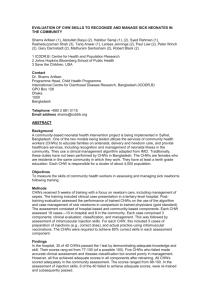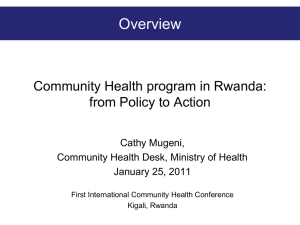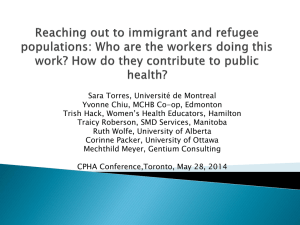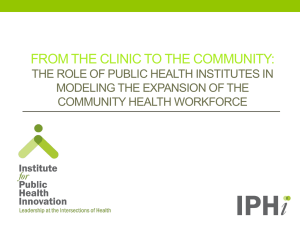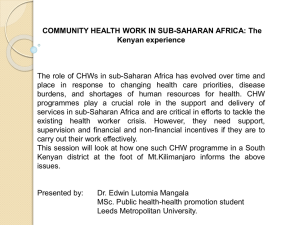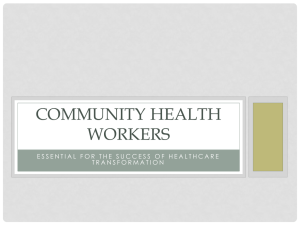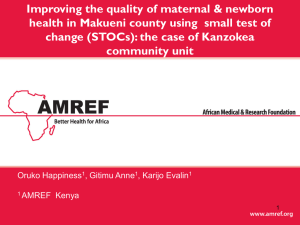Amuda`s Report on "Community Health Workers in Africa
advertisement
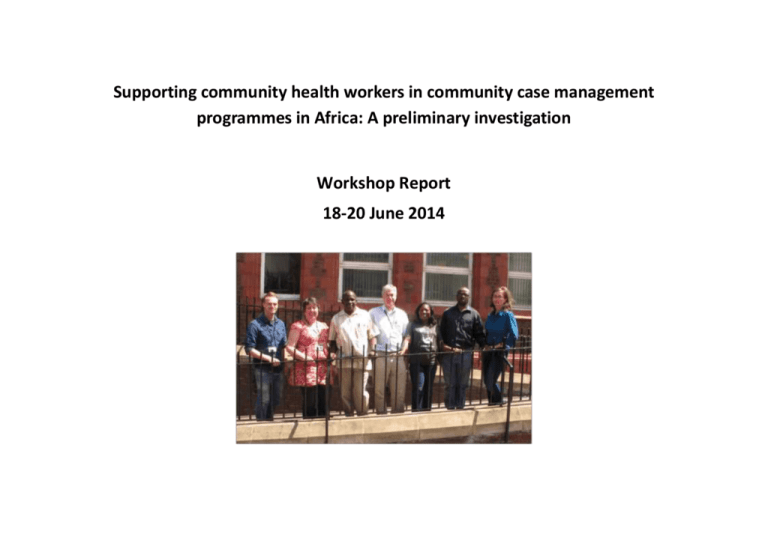
Supporting community health workers in community case management programmes in Africa: A preliminary investigation Workshop Report 18-20 June 2014 Introduction This is a brief report of the workshop, which took place at the Foresight Centre, Liverpool in June 2014. The workshop covered: reviews of findings from the country case studies, synthesis of the country case studies and findings from CHW literature reviews and CHW costing study; development of research questions; and next steps for finalising reports, dissemination, and development of full research project. Please note that the presentations are embedded in this document (double click to view). Objectives 1. 2. 3. 4. To review a synthesis of human resource management (HRM) strategies used in the country case studies Identify lessons from carrying out research on the management of CHWs To identify research gaps in the HRM of CHWs Develop initial ideas for the full research study on HRM of CHWs Inputs Country case studies (draft reports) Comments on country case studies by relevant research team “Strategies for performance management, attraction, and retention of community health workers: a review of the literature” (Draft July 2012) Project proposal document Outputs Revision to country case studies and identification of further review tasks List of potential research questions for full scale project Lessons on methods for researching HRM for CHWs Agreed work plan for completing project Participants Attending all sessions Name Institution Stephen Buzuzi Biomedical Research and Training Institute, Zimbabwe Patricia Akweongo School of Public Health, University of Ghana Amuda Baba IPASC, Democratic Republic of Congo Tim Martineau LSTM, Liverpool Joanna Raven LSTM, Liverpool Ed Roome LSTM, Liverpool Sophie Witter Queen Margaret’s University, Edinburgh Attending some sessions Sally Theobald LSTM, Liverpool Skype only Rozi McCollum Sebastian Baine LSTM, Liverpool (REACHOUT project) Makerere School of Public Health, Uganda Neither the Uganda not the Senegal teams were able to attend, but we managed to be in contact with Sebastian Baine from Uganda by skype during the workshop. Timetable Times 9.00 9.30 Wednesday Coffee and conversation Introductions: (Tim) Participants Overview of the project Overview of the workshop HRM framework (Tim) Times 9.00 9.30 Thursday Coffee and conversation Conference call with Senegal and Uganda teams (Tim) Times 9.00 9.30 Friday Coffee and conversation Conference call with Senegal and Uganda teams (Tim) 10.00 Review of tasks of CHWs Discussion 10.00 Further development of study design (Tim, Jo, Sophie) 11.00 11.15 Tea break Country case studies (Jo) Who is a CHW? Overview of data methods and analysis Presentation of synthesised findings 11.00 11.30 Tea break Fulfilment of CHWs’ expectations Discussion Applicability of performance management strategies (against HRM framework) Discussion 11.00 11.30 1.00 2.00 Lunch Discussion of synthesis of findings (Jo) 1.00 2.00 Lunch Development of research questions: In pairs and plenary 1.00 Tea break Further development of study design (continued) Next steps: (Tim) Finalising country reports Developing and finalising overall project report Developing full research project Close Lunch 3.00 Literature reviews CHW and incentives literature review (Tim) REACHOUT literature review (Sally and Rozi) 10.00 4.00 4.15 – 4.30 5.30 GHWA CHW costing study (Sophie Witter) Tea break Wrap up of the day (Tim) Close Lecture: Malcolm McNeil (DfID Research), 4.00 4.15 – 4.30 5.00 Tea break Wrap up of the day (Jo) Close Dinner Commentary WEDNESDAY 18 T H JUNE Introduction (30 minutes) Introduction of participants Overview of research project Overview of the workshop Introduction.pptx Presentation: HRM Framework presentation (60 minutes) The HRM framework for research on the management of CHWs. This will provide the thinking behind the design of the project including the framework for reviewing attraction, retention and performance management strategies and the relationships between the management actors. It will also describe the synthesis framework used in the country reports. Presentation: Human resource management of CHWs.pptx Country Case Studies (105 minutes) Who is a CHW? Each partner presents themselves as a CHW from their case study: RECO Benoit for DRC; ?? from Zimbabwe; ?? from Ghana Brief overview of data collection methods Brief description of process of data collection by country Description of data analysis methods Presentation of synthesised findings Presentation: Country case studies presentation and discussion.pptx Discussion of synthesis of findings (60 minutes) 1. 2. 3. Questions for clarification Reactions from country researchers to synthesis of findings Key questions: have we included all the key findings in the synthesis? What does this tell us about the appropriateness of the current HRM strategies? What does it tell us about the management structures in place? Literature reviews (60 minutes) Key points from the CHW and incentives literature review TDRlitreview.pptx Presentation: Key points from REACHOUT overview and literature review Presentation: REACHOUT overview TDR.pptx Key points from GHWA CHW costing study Presentation: Summary CHW cost eff study.pptx Wrap up of the day (15 minutes) Evening: attend Malcom McNeil’s lecture for the consultancy course Lecture by Malcolm McNeil, DfiD: “This is a fine mess that you got me into! Common blunders in international health consultancy and how to avoid them”. THURSDAY 19 T H JUNE Conference call with Uganda teams (30 mins) Shared discussions and outputs of day 1 with Uganda team Review of tasks of CHWs from case studies (60 minutes) (1) Extension of the formal health service home based treatment of malaria, diarrhoea, ARI… (case management) follow up of TB/HIV patients assisting in clinics (weighing, record keeping) health education; data collection (community register); disease surveillance attending births (?emergency) antenatal (drugs, education, surveillance, referral) and postnatal (monitoring newborn danger signs) (2) Promotion/distribution/organising function EPI: defaulter tracing, mobilisation (e.g. promoting health insurance scheme) health education bed nets, distributing, checking use HIV/AIDS prevention nutrition/cookery classes/breastfeeding (3) hygiene/sanitation/personal health family planning education and contraceptive distribution MDA – distribution; house-to-house (annual) general home visit stimulating demand for and raising awareness of formal health services/referrals referrals of STI, ANC, complications in pregnancy, under 5s, HIV testing and counselling, burns/injuries Community organisation encouraging community to undertake specific tasks (ambulance, addressing specific health issues e.g. clean-up and tidying tasks, collecting water for the health centre, health facility maintenance/repairs) assisting in health-related campaigns (e.g. introduction of new drugs) advocacy for community ownership of programmes (e.g. support to CHO and CHPS programme) represent community at meetings (health committee, development committee) linking with other volunteers (e.g. working with other NGOs) Fulfilment of CHW’s expectations (60 minutes) Expectations **Bridge into paid health worker role (enhancing employability) lacking qualifications seeking work experience Fit with other roles (e.g. teachers) Fulfilled ?some move on to other health jobs, but quite rate (cf. average job tenure in case studies) Conditions Creating career pathways ?No Coordination of demands on CHWs / general coordination of incentives Manageable with day job and other responsibilities More flexibility, unpredictability of job requirements Skill + knowledge enhancement enhancing skills for their other main jobs enhancing health skills to serve their families at home ability to travel outside community Yes More negotiation with donors and national programmes – how to prioritise what CHWs can reasonably do Certificates Refresher training – frequency and quality (HS) *Non-financial benefits free or subsidised treatment **help with farming **exemption from community labour + levy **priority access to health programmes + employment Social status and prestige t-shirts/uniforms boots, brollies, bags, badges ‘Doctor’ – community status and respect recognition as a health worker Financial per diems for training and events (T&T; travel) fixed stipends – per time (national prog) or per activity (vertical) entry into comm jobs e.g. with NGOs **Serving community Fulfilling socio-cultural (or religious) obligations to serve community Desire to save lives and make a difference to people’s health (?intrinsic motivator) inheriting the job (family ownership) non-dismissable (no matter how poor performance is) Yes No ? Yes Varied (not always valued in community) Uniform has to fit! Regularity of supplies (HS) Take seriously (HS) Comm leaders organise involve them Legitimacy of selection (Comm/HS) ?Irregular/insufficient HS or community has to provide (comm/HS) +Costs (some CHWs are in effect paying to do the job!) Managing community expectations/dialogue with community +varied Applicability of performance management strategies (against HRM framework) (30 minutes) The set of strategies presented in the HRM session was reviewed for suitability and possible adaptation for use with volunteer CHWs. Direction Induction – OK (check content and length; celebrate status) Job descriptions – OK (need to develop between HS and community/leaders) Work plans – OK (simple and flexible to meet wider obligations e.g. gender implications) Appraisal – OK (360 degree involving community) Supportive supervision – OK (major issue in REACHOUT analysis) Team meetings – OK (recognition by formal HWs; networking; must be efficient use of time - has financial/resource costs for CHWs) Resources Availability of equip, drugs and supplies – OK (major issue) Infrastructure (e.g. buildings) Transport – OK (inc maintenance e.g. bikes) Information systems – OK (limitation and coordination of data collection to reduce burden) Finance – OK (regularity, adequacy, fairness, coordination, reality vs rhetoric of community contributions) Community support – Yes including labour and exemptions Boots, bags and brollies - Yes Competencies Merit based recruitment – OK (realism to labour market; legitimacy of selection in eyes of community) Appraisal – OK (assessing quality of service and technical ability) Training and development – OK (need harmonised curriculum; ?follow-up) Rewards and sanctions Team incentives based on performance – scope to do better? Individual incentives based on performance – will come more Additional responsibilities – formalise the career structure and providing opportunities for advancement (even within CHW role) Transfer staff to more desirable posting - NO Issue verbal and written warnings – NO (people can just walk) Withhold pay – NO (people can just walk) Dismissal – can but culturally difficult (making it very rare) Community recognition – YES Development of research questions (120 minutes) The following steps were used: 1. 2. 3. 4. Working in pairs to write possible questions on post-it notes Grouping of post-its Scoring of research questions by relevance/importance (choice of 5 in order of preferences with 5 = highest) Adding scores for each group to prioritise (see Table x with priority questions produced) Table 1: Research questions generated in Liverpool CHW workshop 20 June 2014 Table 1: Research questions prioritised Coping strategies Coordination and priorities 1. What are the coping strategies of CHWs in different contexts? 7. How can demands on CHWs be better coordinated? 2. What are the coping strategies of CHWs in different contexts? 8. How do the different stakeholders coordinate their expectations in using CHWs? 3. What are the real costs of working as a volunteer CHW? (CHW perspective) 9. 4. Are there other forms of reward that we don’t know about? Unintended consequences? 5. What are the CHW expectations? Are they met? What happens if not? (Positive deviance). How can we integrate/ harmonise and prioritise work of CHWs (national and community level)? How do CHWs prioritise activities and how do they cope with family obligations? How do CHWs prioritise activities and how this relates to incentives? How to CHWs manage competing demands? a. Resign b. Stay but inactive c. Prioritise d. Find coping strategies e. Suffer 6. How do CHWs prioritise their work given multiple expectations – efforts / outputs / inputs? 10. 11. 12. Performance management 13. How to manage non-performing CHWs? (in absence of formal sanctions) 14. How can we adapt standardised performance management strategies for CHWs? What works and how? 15. How can we foster supportive supervision (peer to peer supervision) for CHWs? 16. What factors influence CHW competencies? 17. Are there differences in expectations between active and non-active CHWs? Evening: dinner Followed by World Cup: England (1) vs Uruguay (2) FRIDAY 20 T H JUNE Conference call with Uganda team (30 minutes) Shared discussions and outputs of day 2 with Uganda team Further development of study design (150 minutes) Through animated discussions, we developed the following research questions and ideas for methods (see figures 1 and 2) Figure 1: Study questions refined Figure 2: Ideas on methods added Next steps (45 minutes) 1. Completing and dissemination of country case studies a. Jo to send additional reviewer comments and revised table by 4th July b. Partners to send comment by 18th July c. LSTM to send final copy by early August d. Partners to check with district managers for factual errors and send feedback by 31st August 2. Dissemination of country reports - partners to decide on most appropriate process and implement 3. Finalisation of synthesis report a. LSTM to develop and distribute draft by mid-August b. Partners to comments by 31st August c. LSTM to develop presentation for Cape Town (abstract accepted) by mid-September d. Submit report by 30th October e. Develop and submit paper to special issue on CHWs in HRH journal by 24th November 2014 4. Design full study a. Small working group to meet in afternoon of 20th and develop more detailed plans b. TDR to be consulted at an early stage of proposal development c. Drafts to be shared when ready d. Specific country information may be requested from partners Close Lunch
